|
|
|
Sort Order |
|
|
|
Items / Page
|
|
|
|
|
|
|
| Srl | Item |
| 1 |
ID:
185256


|
|
|
|
|
| Summary/Abstract |
The military environment presents an intersection between a setting featuring unavoidable risk and individual risk-taking propensity; prior work suggests risk-takers have positive and negative outcomes here, and messaging about risk-taking in the military is mixed. The current study used social identity theory to examine how self-reported risk propensity related to three identities/outcomes among cadets at the U.S. Military Academy: attributes of an archetypal “Model Soldier” (physical and military excellence), “Model Student” (grade point average, service positions, and behavior), and Military Values (bravery, duty, and resilience). Structural equation modeling demonstrated that risk-taking was positively related to our Model Soldier and Military Values identities but negatively associated with being a Model Student. Additionally, high-risk-taking cadets were viewed by peers and instructors as confident but prone to judgment, self-discipline, and insight difficulties, suggesting overconfidence among risk-takers. Quantified as a difference between confidence and self-discipline, judgment, and insight, overconfidence mediated the relationship between risk-taking and the three identities, suggesting overconfidence drives both positive and negative associations with risk-taking. Military and leadership implications are presented.
|
|
|
|
|
|
|
|
|
|
|
|
|
|
|
|
| 2 |
ID:
185250


|
|
|
|
|
| Summary/Abstract |
What explains the post–Cold War surge in peacekeeping contributions from the developing world? I argue that, amid a wave of democratization and expanded peacekeeping activity, such countries use peacekeeping deployments to reduce the threat of the military to nascent democratic institutions. Peacekeeping participation serves to placate the military in the short term with resources and continued activity, while socializing and professionalizing it to pro-democracy behaviors in the long term. Assessing troop contributions from 1990 to 2011, I find evidence that new democracies make larger contributions than other states, where the effect diminishes as democracy becomes consolidated. Moreover, the effect is amplified in countries with a greater military legacy. I supplement this with a study of Argentina to further support the proposed mechanism. These findings help explain the shift in state peacekeeping contributions in recent years, the role of democracy in peacekeeping efforts, and the impact of international actors in supporting democratization.
|
|
|
|
|
|
|
|
|
|
|
|
|
|
|
|
| 3 |
ID:
185251
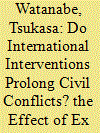

|
|
|
|
|
| Summary/Abstract |
Many studies have found that third-party intervention tends to prolong the duration of civil conflict. However, some studies have suggested that mere expectations of external intervention can prolong conflict duration even in the absence of actual intervention. Therefore, the effects of external interventions in prolonging the duration of civil conflicts remain unclear. This study examines the direct effect of third-party intervention on the duration of civil conflict by controlling for the indirect effect of expectations of external intervention. The probabilities of intervention were estimated, and the direct effect of interventions was tested by controlling for the effect of ex ante expectations. The empirical findings were as follows: (1) Third-party intervention has no direct effect of prolonging the duration of a conflict when expectations are controlled for, and (2) Third-party intervention may have an indirect effect of shortening conflict duration, which contradicts the findings of previous studies.
|
|
|
|
|
|
|
|
|
|
|
|
|
|
|
|
| 4 |
ID:
185255
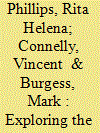

|
|
|
|
|
| Summary/Abstract |
Evidence suggests that most of the UK public appreciate currently serving UK Armed Forces personnel but are less positive in their beliefs about veterans. This research examined the social representations held by civilian participants of UK veterans and serving soldiers to understand why veterans may be seen more negatively. An open-ended word association task was completed by 234 UK participants where they were asked to provide three initial responses to the words “veteran” and “soldier” and to evaluate their responses in accordance to prototypicality. The 1,404 resultant associations were grouped into 14 thematic clusters. Using the hierarchical evocation method, the results suggest “heroizing associations” to be a defining core element for “soldier” and “veteran” but “victimizing associations” to be an element only for “veteran.” Principal component analyses suggest victimizing associations are related to war and deindividuated associations; “heroizing associations” are related to characterizations of the veteran’s personality. Implications and future directions are discussed.
|
|
|
|
|
|
|
|
|
|
|
|
|
|
|
|
| 5 |
ID:
185258
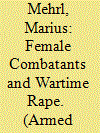

|
|
|
|
|
| Summary/Abstract |
Whereas existing research posits that the presence of female fighters in armed groups decreases their propensity for wartime rape, one recent study tests this claim quantitatively and is unable to detect a statistically significant effect. This leads the author to conclude that female combatants do not decrease rape. Using that study’s original data, this article reexamines the evidence for the relationship between female rebel combatants and wartime sexual violence. Replications of the original models suggest that they make strong functional form assumptions regarding numerous independent variables and time dependence and that relaxing them results in substantively different findings. Namely, women’s participation in armed groups decreases groups’ use of wartime rape. In support of Loken’s organizational theory of rape, results also suggest that this effect is moderated by group norms. These findings contribute to the literature on female participation in rebel groups and beyond.
|
|
|
|
|
|
|
|
|
|
|
|
|
|
|
|
| 6 |
ID:
185249
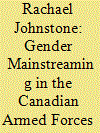

|
|
|
|
|
| Summary/Abstract |
This article uses the Canadian military’s gender-mainstreaming strategy—gender-based analysis plus (or GBA+)—as a case study to explore the implementation of gender mainstreaming in militaries. Utilizing a mixed method approach, including group interviews and surveys, we employ Jahan’s model of gender mainstreaming to understand how GBA+ has been operationalized. We argue that the implementation of GBA+ in the Defense Force constitutes a more superficial integrationist approach to the implementation of gender mainstreaming rather than a transformative, agenda-setting approach, despite the internalization of messaging to the contrary by many in the Canadian Armed Forces (CAF) and the Department of National Defence (DND). While not ideal, we suggest that an integrationist approach does not necessarily mean a GBA+ agenda will fail in a male-dominated organization like the CAF; rather, we contend that it could constitute a valuable starting point for progressive, large-scale change.
|
|
|
|
|
|
|
|
|
|
|
|
|
|
|
|
| 7 |
ID:
185252


|
|
|
|
|
| Summary/Abstract |
Samuel Huntington theorized in The Soldier and the State that rather than make the military in the image of society (subjective control), both superior civilian control and military outcomes would result if the military was allowed its own sphere and culture, shaped by military requirements (objective control). Since 1963, the Canadian Armed Forces have argued for objective control, while political leadership and the country have largely paid little attention to military demands for greater social independence. An examination of defense policy, the “civilianization” crisis, the Somalia Inquiry, and diversity legislation and programs demonstrate the triumph of subjective control. This article concludes that subjective control has had costs to civilians in military shirking and to the military in alienation from its parent society. Huntington remains useful, but it is time to consider modern alternatives to understand civil-military relationships.
|
|
|
|
|
|
|
|
|
|
|
|
|
|
|
|
| 8 |
ID:
185260
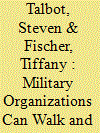

|
|
|
|
|
| Summary/Abstract |
This article is a response to a recent publication by Hasselbladh and Ydén in this journal, entitled “Why Military Organizations Are Cautious About Organizational Learning?” Through their use of dichotomous logic, the authors argue continuous learning poses a threat to the functioning of military organizations. The following commentary argues for a necessary coexistence between the mainstays of the traditional bureaucratic military organization presented by Hasselbladh and Ydén and continuous learning required by military organizations to compete and cope with technological advancements and gray zone challenges afforded by the modern operating environment.
|
|
|
|
|
|
|
|
|
|
|
|
|
|
|
|
| 9 |
ID:
185261
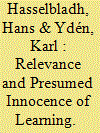

|
|
|
|
|
| Summary/Abstract |
Responding to Soeters and Talbot and Fischer, we clarify our position that learning in military organizations is highly contingent on established organizational frameworks, vocabularies, and understandings and constrained by existing power relations. The danger present in military operations increases the importance of minimizing internal frictions and constrains local experimentation and the application of different solutions. Thus, while there is learning in military organizations, the latter are less prone than large, civilian organizations to venture into the use of new and unproven solutions. The present debate about learning in military organization reflects the different basic assumptions about formal organizations in management studies as opposed to the field of organizational sociology.
|
|
|
|
|
|
|
|
|
|
|
|
|
|
|
|
| 10 |
ID:
185257
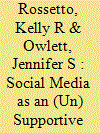

|
|
|
|
|
| Summary/Abstract |
The current study explored how romantic partners of active-duty service members perceived social media as (un)supportive when dealing with military lifestyle challenges. This study also explored coping and support paradoxes as they play out when military partners are using social media to help them cope. Twenty-four partners (female, n = 22; male, n = 2) participated in interviews. Participants reported mostly using Facebook (e.g., spouse groups) for dealing with military lifestyle challenges. Supportive functions included seeking and providing support and relational maintenance and development. Unsupportive functions included reinforced boundaries and support breakdowns. Findings are discussed with a focus on communal coping and coping and support paradoxes.
|
|
|
|
|
|
|
|
|
|
|
|
|
|
|
|
| 11 |
ID:
185254
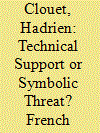

|
|
|
|
|
| Summary/Abstract |
Since the mid-2000s, French military telecommunications have been partially outsourced to private companies. This was justified by an intent for budgetary savings and efficiency. However, an interview survey conducted among military technicians shows that this transfer weighs upon their work and expectations. Outsourcing damages the profession’s appeal, deprives staff of strategic resources, and places their time under the control of private providers. This represents a symbolic cost for the personnel committed to the institution but also grants symbolic benefits to officers who are hostile to the process. Although they were not designed for this purpose, market procedures closely regulate the activity of frontline military technicians.
|
|
|
|
|
|
|
|
|
|
|
|
|
|
|
|
| 12 |
ID:
185253


|
|
|
|
|
| Summary/Abstract |
This study presents an empirically grounded account of tunnel combat operations in the Israel Defense Forces (IDF) within the context of “post-heroic” warfare. Current scholarship on “post-heroism” has viewed the technological and professional standards of contemporary military conflicts as distancing the individual combatant from the modern battlefield. Little attention has been given however to the ways in which soldiers themselves experience and adapt to post-heroic conditions. Findings based on in-depth semistructured interviews with 17 IDF tunnel combatants show these soldiers actively reinterpreting the strategic importance placed on distancing the warrior from the battlefield. This exploratory article suggests that an individual “warrior ethos” still resonates amid the professional and technological contours of post-heroic (underground) conflicts. By presenting a novel account of contemporary tunnel warfare from the perspective of the combatants themselves, this research sheds new light on the different personal dimensions that impact post-heroic military operations.
|
|
|
|
|
|
|
|
|
|
|
|
|
|
|
|
| 13 |
ID:
185259
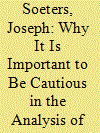

|
|
|
|
|
| Summary/Abstract |
This article is a reply to a recent publication by Hasselbladh and Yden in this journal, entitled “Why Military Organizations Are Cautious About Learning?” They argue that there is good reason for military organizations not being very successful in organizational learning. Based on historical experiences related to the military’s bureaucratic character and specific task environment, they argue that military organization’s hesitation to learn is not necessarily dysfunctional. This reply refutes this assertion as it is not based on sufficient knowledge of organizational learning in general, but more importantly because it “scholarly” legitimizes the impeding of attempts to improve military performance in the broad sense of the word.
|
|
|
|
|
|
|
|
|
|
|
|
|
|
|
|
|
|
|
|
|